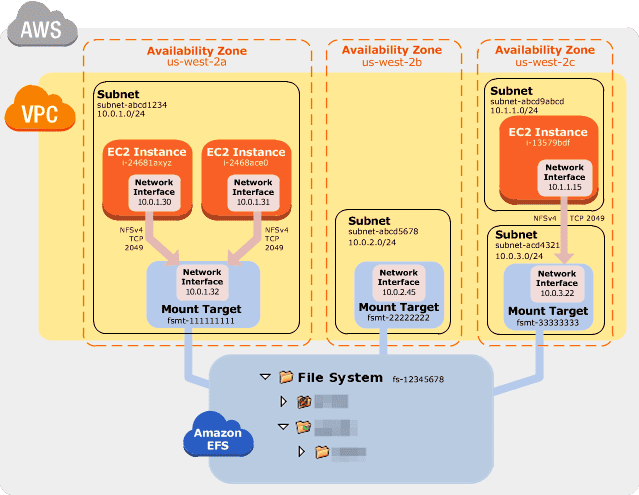A Brief on Amazon Elastic File System (EFS)

Written by Priya George
Content Writer
May 18, 2023
Amazon Elastic File System (EFS) | Cloud File Storage
The cloud-based file storage service Amazon Elastic File System (EFS) runs on AWS for all applications and workloads. EFS is a simple, scalable file storage tool. It has a simple interface that creates and configures file systems quickly and easily. The storage capacity is elastic, automatically scaling up or down depending on the volume of data, and is a fully-managed service that can run without provisioning. In addition, the flexible billing model helps to pay only for the storage in use.

Amazon Web Services spontaneously deploys and manages the infrastructure for EFS, distributed across unlimited servers to avoid performance blockages. In addition, Amazon EFS offers flexible storage capacity that scales to put up workloads running on Elastic Compute Cloud (EC2) instances.
Amazon EFS is intended to be highly available and durable for numerous EC2 instances connected to the service.
Amazon EFS file system provides a standard file system interface and file system access semantics to seamlessly integrate Amazon EFS with the existing applications and tools for all the Amazon EC2 instances. As a result, many Amazon EC2 instances can access an Amazon EFS file system instantaneously, letting the Amazon EFS be available with a shared data source for workloads and applications running on one or multiple Amazon EC2 instances.
Amazon EFS file systems can be mounted on on-premises data center servers when connected to Amazon VPC with AWS Direct Connect. To migrate data sets to EFS, enable cloud bursting scenarios, or back up your on-premises data to EFS, the EFS file systems need to be mounted on on-premises servers. AWS Elastic File System is available across all AWS regions.
Read our story on how we helped an airline company move its on-prem storage to the cloud with the help of AWS DataSync.
AWS EFS Features
Several features make the fully-managed AWS EFS stand apart from its competition. For instance, multiple AWS EC2 Instances can access an EFS share simultaneously. Furthermore, it is fast & easy to deploy, has shared storage, high availability & durability, consistently low latencies, elastic capacity, end-to-end encryption, and multiple data movement options.
Several new feature updates to the Elastic File System over the years have resulted in multiple benefits to businesses:
- The availability of EFS One Zone Infrequent Access (EFS IA). There are two storage classes for file systems that are not accessed frequently: Amazon EFS Standard IA and Amazon EFS One Zone IA. Both these storage classes can reduce costs by 92% compared to the standard storage classes. EFS One Zone IA is ideal for files accessed less frequently but must be available quickly. It is perfect for backup, disaster recovery (DR), and archiving. Want to learn how to safeguard your data? Read our story on how we helped a financial company safeguard its infrastructure with AWS Elastic Disaster Recovery.
- With EFS File Sync on Amazon Web Services, customers can quickly move files between an existing file system on on-premises storage systems and Elastic File System. It is a fast, simple, and reliable way to transfer files to and from Amazon EFS and eliminates the need to use complex scripts or third-party tools, reducing the risk of errors and data loss. With EFS File Sync, businesses can effortlessly migrate a large data volume to the cloud and benefit from the scalability and flexibility of Amazon EFS.
- Amazon Web Services recently announced that Amazon EFS now supports AWS PrivateLink, which allows customers to access Elastic File System over a private connection. This development improves the file system security of the service by ensuring that all data in transit is encrypted. It also reduces latency for customers needing to access AWS resources data frequently.
- Amazon Web Services has introduced IAM authorization for Elastic File System. IAM enables businesses to control access to their Amazon EFS file systems using permissions and policies. This update allows administrators to restrict access to specific files or directories, making it easier to manage data securely.
- Amazon EFS has improved its performance by introducing support for NFS (Network File System) version 4.1. With NFS version 4.1, businesses can improve application performance and reduce latency by enabling multiple clients to access the same file system concurrently. This update is particularly beneficial for applications that require low-latency, high-throughput access to large volumes of data.
Amazon EFS Benefits
- Greater Efficiency
- Greater Agility
- Rapid Scalability
- Lower Costs
- Greater IT staff productivity
- Reduce wasted resources
- Higher utilization of IT investments
- Enhanced security and protection of information assets
AWS EFS Use cases
- Enterprise Applications: To avail of the agility, flexibility, and availability of the cloud, businesses need a file system service that is durable, elastic, and scalable. With AWS EFS standard file system interface and semantics, businesses will find it easier to migrate their apps to AWS resources or build new ones.
- Big Data & Analytics: As a DevOps or database admin, you must often create temporary data stores or backups during data migration. With AWS EFS Replication, you can ensure easy data migration and the creation of data copies that can quickly be deleted once the original migration has been completed. EFS replication is an EFS service that allows you to create a replica of your EFS file system.
- Media & Entertainment Processing Workflows: These industries rely on a wide range of business operations, which requires storing significant data assets. With Amazon Web Services, companies can use Amazon S3 for object storage and EFS for file storage. And both AWS resources have options where companies can avail of storage cost optimization where the cost depends on the frequency of data retrieval.
- Home Directories: With EFS, company admins can create a shared file system for home directories when setting up virtual workstations. Placing home directories on shared storage allows user preferences to carry on across virtual workstations.
- Content Management & Web Serving: Content management systems require data availability, concurrent access, dynamic scalability, shared plug-ins, and high aggregate throughput without denting performance. Modernize persistent storage for content management workloads with Amazon EFS.
- Software Development Tools: Increase DevOps agility by sharing files securely. Create persistent data stores and share data from AWS containers and serverless apps with zero overhead management. With the new file system from Amazon EFS, companies can modernize their app development process.
- Container Storage: AWS EFS file system can be attached to containers launched by Amazon Elastic Container Service (ECS) and Amazon Kubernetes Service (EKS), which can be used for long-running containers that share data. Watch our webcast and learn how to leverage cloud infrastructure using AWS containers.
How Royal Cyber Can Help
Royal Cyber can harness the full power of the cloud with Amazon EFS with all the above features, and every organization can benefit from our AWS services. Do you want our experts to manage the cloud? Email us for more information at [email protected] or visit www.royalcyber.com for more details.
Recent Blogs
- Enhance IT security & efficiency with Royal Cyber’s Managed IT Services. Reduce downtime, cut costs …Read More »
- An Insight into ServiceNow Hardware Asset Management (HAM) Ramya Priya Balasubramanian Practice Head ServiceNow Gain …Read More »
- Learn to write effective test cases. Master best practices, templates, and tips to enhance software …Read More »



